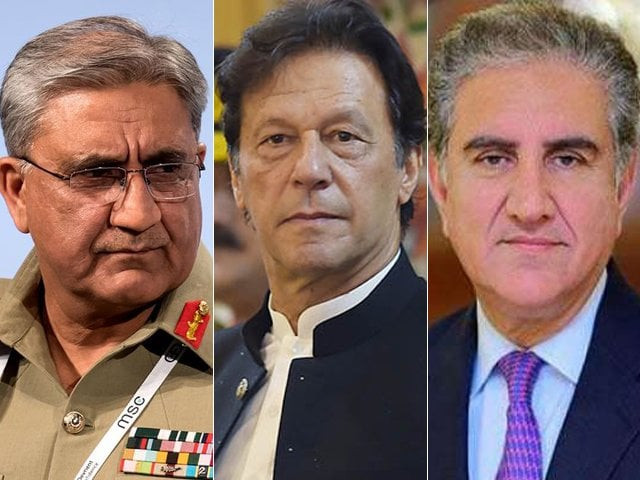Pakistan launches diplomatic offensive to seek de-escalation in ME
PM Imran directs FM Qureshi to visit Iran, Saudi Arabia and US; asks COAS to reach out to concerned military leaders

COAS Gen Qamar, PM Imran and FM Qureshi. FILE PHOTOS
While Prime Minister Imran Khan on Wednesday made it abundantly clear that Pakistan would not become party of any war, he offered Pakistan’s good offices to all the players for defusing the brewing tensions in the region.
For this purpose, he directed Foreign Minister Shah Mehmood Qureshi to undertake visits to Iran, Saudi Arabia and United States and at the same time asked Chief of Army Staff (COAS) General Qamar Javed Bajwa to reach out to relevant military authorities.
“I have asked FM Qureshi to visit Iran, KSA and USA to meet with respective foreign ministers, secretary of state and COAS Gen Bajwa to contact relevant military leaders to convey a clear message: Pakistan is ready to play its role for peace but can never again be part of any war,” the premier wrote on Twitter.
I have asked FM Qureshi to visit Iran, KSA & USA to meet with respective foreign ministers, Secretary of State; & COAS Gen Bajwa to contact relevant military leaders to convey a clear message: Pakistan is ready to play it's role for peace but it can never again be part of any war
— Imran Khan (@ImranKhanPTI) January 8, 2020
This was his first statement on the Middle East crises since US in an unprecedented move assassinated Iranian General Qassem Soluemani in drone strikes in Iraq.
Pakistan won’t become part of US-Iran conflict: PM
Last night, Iran retaliated with firing over dozen missiles targeting the two main military bases in Iraq. While the Iranian media reports claimed causalities of American servicemen but President Trump said “all is well” and said authorities were assessing the damage if there were any.
Amidst the uncertain situation, General Qamar also received a telephone call from US Defence Secretary Mark Esper.
“Both discussed ongoing security situation in the Middle East. Secretary Esper expressed that the US doesn’t want to seek conflict, but will respond forcefully if necessary,” said a statement issued by the Inter-Services Public Relations (ISPR).
“We would like situation to de-escalate and shall support all initiatives which bring peace in the region. We call upon all concerned to avoid rhetoric in favour of diplomatic engagement. We all have worked a lot to bring peace in the region by fighting against terrorism,” the army chief was quoted as saying during the telephonic conversation by the military’s media wing.
US secretary of defence seeks Gen Qamars advice on fast-escalating MidEast conflict
“We will continue to play our constructive part towards success of Afghan reconciliation process so that it doesn’t get derailed and region goes towards conflict resolution instead of new conflicts,” the army chief added.
Meanwhile, Foreign Minsiter Qureshi said following the prime minister’s directives, he was reaching out to his respective counterparts in Iran, Saudi Arabia and the US as part of Islamabad’s efforts to seek de-escalation.
Qureshi said war did not serve anyone’s purpose, therefore it was important that all sides must resolve all issues through constructive engagements.
The foreign minister already spoke to his counterparts in Iran, Saudi Arabia, UAE, Kuwait and Turkey to discuss the evolving situation in the Middle East.
Pakistan’s efforts to seek de-escalation stemmed from the fact that any full-scale war between Iran and the US will have serious implications for the country.
Mindful of the negative fallout of any such situation, the government in principle has decided to stay away from the conflict and would only focus on seeking de-escalation in tensions.



1724319076-0/Untitled-design-(5)1724319076-0-208x130.webp)















COMMENTS
Comments are moderated and generally will be posted if they are on-topic and not abusive.
For more information, please see our Comments FAQ